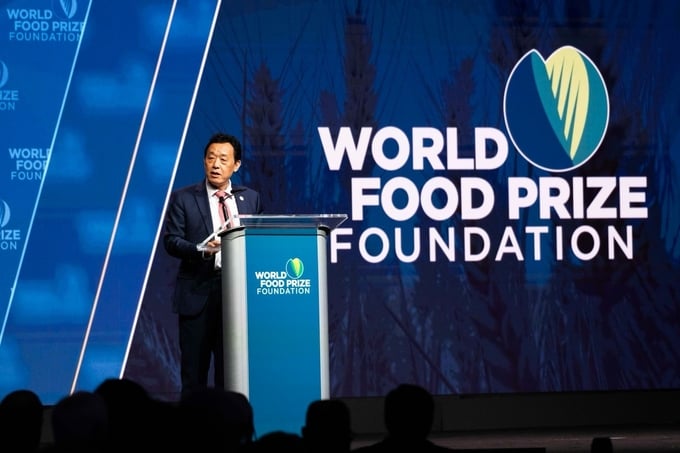November 25, 2025 | 00:54 GMT +7
November 25, 2025 | 00:54 GMT +7
Hotline: 0913.378.918
November 25, 2025 | 00:54 GMT +7
Hotline: 0913.378.918

FAO Director-General QU Dongyu delivers a keynote speech in Des Moines, Iowa.
Breakthroughs in genetic science have brought the world to “the dawn of a new era” and can propel solutions to a spectrum of inter-related global challenges including assuring food security, tackling the climate crisis and protecting biodiversity, QU Dongyu, Director-General of the Food and Agriculture Organization of the United Nations (FAOI), said today at the Borlaug International Dialogue of the World Food Prize 2024 opening ceremony.
“The genetic revolution goes beyond increasing yields,” Qu said, noting how today it can be applied in tailored ways to improve plant and animal resistance to pests, diseases and environmental stressors including high temperatures, droughts, floods, soil salinity and more.
These advancements could also “bring people and cultures closer together,” he added in his keynote speech, From Genetics to the Generation: What Does the Future Hold for Agrifood Systems and Food Culture.
The annual prize, in honor of Norman Borlaug, considered one of the fathers of the Green Revolution that lifted hundreds of millions of people out of hunger thanks to his work on higher-yielding wheat varieties, was awarded this year to Geoffrey Hawtin and Cary Fowler, in recognition of their extraordinary contribution in preserving and protecting the world’s heritage of crop biodiversity, especially in operating and funding crop gene banks all over the planet.
Gene editing
Gene editing technology significantly accelerates breeding processes , acting faster than cross-breeding, mutation breeding and transgenesis methods, said the FAO Director-General, who studied plant breeding and genetics and made important contributions to understanding the potato genome.
Gene or genome editing is a term encompassing various molecular biology techniques. The advent of clustered regularly interspaced short palindromic repeats, known as CRISPR, spurred a rapid increase in gene editing research and applications. CRISPR is faster and less expensive than more conventional ways of crossbreeding, opening up new horizons for environmentally-adaptive and nutrition-sensitive crops and livestock that can protect genetic biodiversity and contribute to building resilient agrifood systems.
FAO’s Director-General emphasized that gene editing can be a boon to the preservation and enhancement of the unique traits of local and indigenous foods, keeping open a “window to our own humanity”, and become “a bridge between the past and the future, connecting food cultures and fostering shared resilience in the face of global challenges.
”For this reason, the FAO Food and Agriculture Museum and Network, to be launched in 2025 at FAO Headquarters in Rome to mark the 80th anniversary of the founding of the Food and Agriculture Organization of the United Nations, will bridge global food technologies and cultures, showcasing the rich traditions and innovative approaches that have shaped the story of agrifood systems over time.
FAO’s experts have produced important contributions to the connections between gene editing and food safety and on agrifood systems more broadly.
Qu emphasized that the Science and Innovation Forum, one of the three pillars of the World Food Forum that FAO hosts each year at its headquarters in Rome, was set up precisely for Members and partners to discuss the benefits and risks of cutting-edge technologies.
It is crucial that the benefits be shared widely and equitably. It is also essential that Members invest in human and social capital needed to make optimal leverage of new technology, he added.
The new World Food Prize winners have a long history of engagement with FAO.
Geoffrey Hawtin, one of the awardees, played key roles in the negotiation of the International Treaty on Plant Genetic Resources for Food and Agriculture, which is hosted by FAO, as well as the creation of the Svalbard Global Seed Vault.
Cary Fowler, currently the U.S. Special Envoy for Global Food Security, led the International Conference and Programme on Plant Genetic Resources at FAO in the 1990s and was the chief author of FAO’s Global Plan of Action for Plant Genetic Resources.
Along with Qu’s keynote address, the ceremony featured a panel discussion on achieving a hunger-free world in which Ajay Banga, President of the World Bank Group, and Akinwumi Adesina, President of the African Development Bank, both participated.
(FAO)

(VAN) Brazil's COP30 presidency pushed through a compromise climate deal on Saturday that would boost finance for poor nations coping with global warming but that omitted any mention of the fossil fuels driving it.

(VAN) Poultry farmers in the UK have been warned that they could face one of the worst winters yet for bird flu.

(VAN) Prices of main-crop paddy have risen sharply, with jasmine rice hitting 16,100 baht per tonne — the highest level in years.

(VAN) In Brazil, FAO unveiled a series of reports and initiatives showing how sustainable agrifood systems are a solution to the climate crisis.

(VAN) With names like neodymium and dysprosium, rare-earth elements sound exotic — and their perceived scarcity has only added to the mystique.

(VAN) In a new study published in Trends in Biotechnology, researchers used a gene-editing technology called CRISPR to increase a fungus's production efficiency and cut its production-related environmental impact by as much as 61%- all without adding any foreign DNA.

(VAN) A top official in Beijing’s Cop delegation says China is committed to clean energy – but US’s absence is a problem.